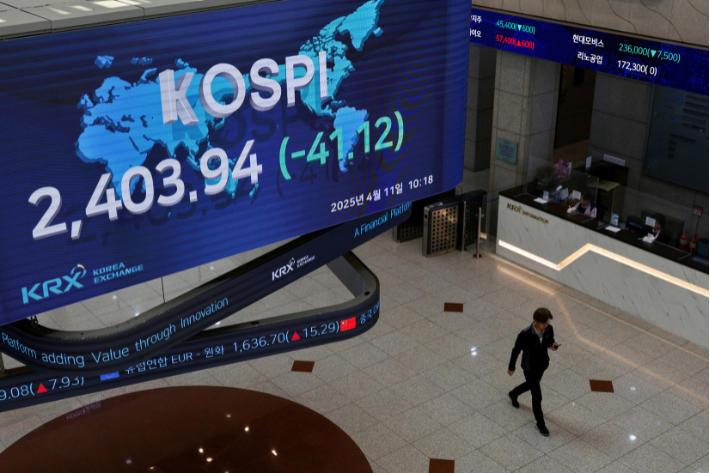Asia’s major stock indexes were under pressure on Wednesday with share prices falling in the face of a muscular dollar and the yen plummeting to a 34-year low.
Japanese stocks were the outlier as they advanced as the yen sagged to its weakest since 1990, but Chinese markets slipped and regional stocks overall lacked strong direction in a holiday-shortened week that ends with a key reading on US inflation.
Tokyo’s benchmark bourse closed higher, as the weaker yen boosted exporters, while retail investors also scooped up stocks set to go ex-dividend after the current session.
Also on AF: Fear of US Sanctions Delaying Oil Payments to Russia, Banks Say
The Nikkei share average was up 0.90%, or 364.70 points, to close at 40,762.73, while the broader Topix was ahead 0.66%, or 18.48 points, to 2,799.28.
Japan’s finance minister was forced to issue his strongest warning yet as the yen’s slide looked set to continue.
Shunichi Suzuki said authorities could take “decisive steps”, language used in autumn 2022 when Japan last intervened in the market to stem weakness in its currency.
The yen has been sliding despite the Bank of Japan’s first interest rate hike for 17 years last week as traders expect very gradual tightening and possible delays to long expected Federal Reserve easing.
The equities picture was less upbeat elsewhere as China stocks fell and the yuan weakened, pressured by a strong US dollar, with strong selling by foreign investors weighing on the market even as data showed the economy is gradually recovering.
Foreign investors had sold a net $1.25 billion of Chinese shares via Stock Connect, and were set to log the biggest daily outflow since mid-January.
Data showed on Wednesday that China’s industrial firms posted higher profits in the opening months of the year but overall gains remain tempered by the persistent fragility in China’s property market.
Hong Kong Tech Suffers
China’s blue-chip CSI300 index was down 1.16%, while the Shanghai Composite Index lost 1.26%, or 38.34 points, to end at 2,993.14. The Shenzhen Composite Index on China’s second exchange dropped 2.80%, or 49.04 points, to 1,703.25.
Chinese H-shares, those belonging to companies from the Chinese mainland listed on the Hong Kong Stock Exchange or other foreign exchanges, fell 0.9% to 5,773.2, while the Hang Seng Index fell 1.36%, or 225.48 points, to 16,392.84.
The Hang Seng Tech index lost 2.25% and the Hang Seng Mainland Properties index dropped 0.57%.
Elsewhere across the region, in earlier trade, Seoul, Jakarta and Wellington were down, while Sydney, Singapore, Taipei, Mumbai, Bangkok and Manila rose.
Overall, MSCI’s broadest index of Asia-Pacific shares advanced 0.1%, but that flipped to a 0.17% decline if Japanese shares were removed.
The US dollar index, which measures the currency against six major peers, including the yen, was 0.07% higher at 104.36, taking it to just below Friday’s five-week high of 104.49.
The euro was flat at $1.08285, sterling fell 0.12% to $1.26175 and US long-term Treasury yields were stable at 4.23%.
Bitcoin Run Continues
Traders are trying to gauge which of the big central banks – the Fed, ECB or Bank of England – will be first to cut rates this year.
Pan-European STOXX 50 futures pointed 0.12% lower, while US S&P 500 futures added 0.32%.
Gold was little changed at around $2,179 as it continued to search for a short-term floor following its surge to a record $2,222.39 on Thursday. Cryptocurrency bitcoin added 0.5% to $70,167.
Crude oil fell for a second day after a report that crude stockpiles surged in the US, the world’s biggest oil user, and on signs major producers are unlikely to change their output policy at a technical meeting next week.
Brent crude futures for May dropped 74 cents, or 0.9%, to $85.51 a barrel. The May contract is set to expire on Thursday and the more actively traded June contract declined 68 cents, or 0.8%, at $84.95.
US West Texas Intermediate (WTI) crude futures for May delivery fell 64 cents, or 0.8%, at $80.98.
Key figures
Tokyo – Nikkei 225 > UP 0.90% at 40,762.73 (close)
Hong Kong – Hang Seng Index < DOWN 1.36% at 16,392.84 (close)
Shanghai – Composite < DOWN 1.26% at 2,993.14 (close)
London – FTSE 100 < DOWN 0.31% at 7,906.58 (0934 GMT)
New York – Dow < DOWN 0.08% at 39,282.33 (Tuesday close)
- Reuters with additional editing by Sean O’Meara
Read more:
China’s Factories Enjoy a Jump in Profits, Official Data Shows
China Launches WTO Complaint Against US Over EV Subsidies
China’s Xi to Meet US Business Chiefs Amid Chip Tensions
Nikkei Flat Despite Tech Rally, Hang Seng Gains on Policy Bets























